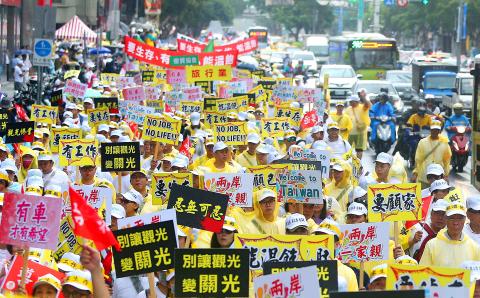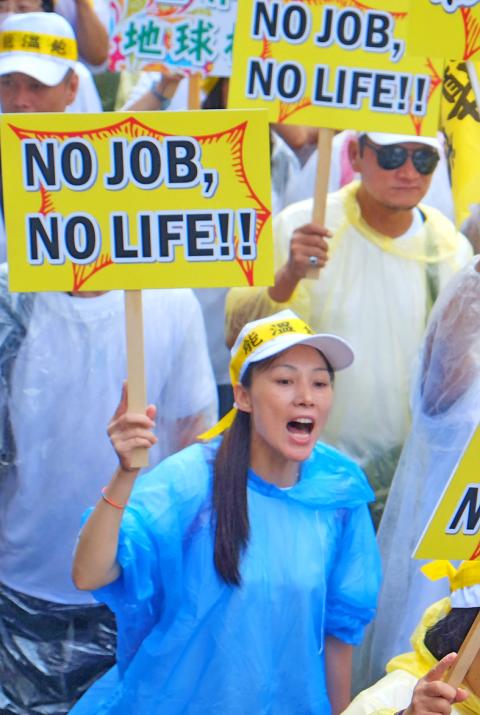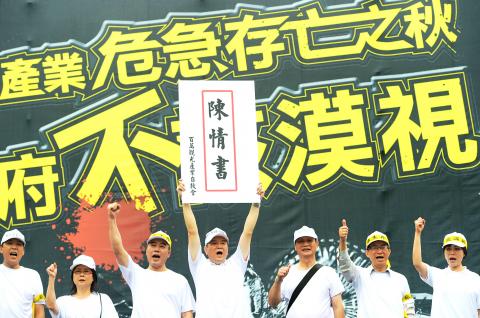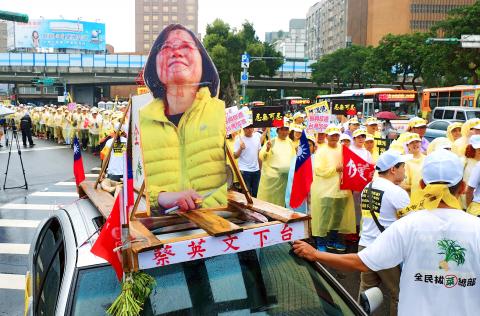About 10,000 people marched through downtown Taipei yesterday afternoon calling on the government to help the tourism industry amid a drop in the number of Chinese tourists.
It was the first-ever protest organized by people and firms in the tourism industry, including travel agencies, tour guides, hoteliers, hostel operators, restaurant owners, tour bus companies and representatives of other businesses.
The march began at the Huashan 1914 Creative Park and headed toward Ketagalan Boulevard by way of Chungshiao E Road, Hanzhou S Road and Renai Road.

Photo: CNA
A travel agency manager from Kaohsiung surnamed Rong (容) said those who took part in yesterday’s protest were “only the tip of an iceberg,” adding that the situation was expected to worsen in the next three months.
“We want to tell the government that its new southbound policy is not going to be an immediate cure to the travel industry’s current plight,” she said.
Tourism operators from southern Taiwan chartered at least 30 buses to bring people to Taipei, Rong said, adding that Chiayi County has been the hardest hit by the drop in Chinese visitor numbers.

Photo: Sam Yeh, AFP
Asked how bad the situation is, Rong said that some guides and bus drivers have been on unpaid furloughs for almost two months because there was no business from Chinese tour groups.
Alishan, a must-see destination for most of the Chinese tourists, now gets fewer than 10 tour buses per day, she said.
Boat owners at Sun Moon Lake (日月潭) are also hurting.

Photo: Chang Chia-ming, Taipei Times
“A tour guide used to be able to handle three tour groups every month, earning a monthly salary of between NT$50,000 and NT$100,000 [US$1,577 and US$3,153], but now they cannot do that anymore and they still have dozens of bills to pay. You can understand their anger and anxiety,” she said.
The NT$30 billion relief fund that the government is planning to spend to help the industry cannot possibly cover all the industry’s losses, she said.
A guide surnamed Lin (林) said that China’s National Day holiday is coming soon, and Japan and South Korea are trying to attract more tourists from China during that period.

Photo: Sam Yeh, AFP
Only Taiwan is trying to push Chinese tourists away, he said, adding: “I really do not know what our government is thinking.”
Lin said he is willing to follow the government’s policy to attract more tourists from Southeast Asia, but it must provide complementary measures to help address the problems businesses are facing.
He said he has a mortgage of about NT$10 million and has not had any income for two months, while his friends who own tour buses are struggling to pay off the loans they took out to buy the vehicles.
A luxury goods store representative from Hualien, who spoke on condition of anonymity, said the NT$30 billion is just a short-term solution.
“We want a fishing rod, not the government just providing us with fish,” she said.
Yesterday’s protest concluded with representatives of the travel industry delivering a petition to the Presidential Office.
The petition said that Taiwan attracted about 2 million Chinese tourists in tour groups last year, and the industry hoped about 1 million Chinese would come on group tours this year, representatives said.
However, that means the government needs to attract about 2 million more travelers from other countries to make up for the shortfall in Chinese tourists because Chinese spend about twice as much time in Taiwan as travelers from other countries, they said.
To make up such a huge shortfall, 12 suggestions were made, ranging from further streamlining visa application procedures for Southeast Asian tourists, allowing Chinese tourists to use their passports for a 72-hour transit in Taiwan before heading to a third country, offering subsidies to international tourists who spend at least two nights in central or southern Taiwan and raising the number of domestic travelers nationwide by giving out vouchers for weekday travel.

The CIA has a message for Chinese government officials worried about their place in Chinese President Xi Jinping’s (習近平) government: Come work with us. The agency released two Mandarin-language videos on social media on Thursday inviting disgruntled officials to contact the CIA. The recruitment videos posted on YouTube and X racked up more than 5 million views combined in their first day. The outreach comes as CIA Director John Ratcliffe has vowed to boost the agency’s use of intelligence from human sources and its focus on China, which has recently targeted US officials with its own espionage operations. The videos are “aimed at

STEADFAST FRIEND: The bills encourage increased Taiwan-US engagement and address China’s distortion of UN Resolution 2758 to isolate Taiwan internationally The Presidential Office yesterday thanked the US House of Representatives for unanimously passing two Taiwan-related bills highlighting its solid support for Taiwan’s democracy and global participation, and for deepening bilateral relations. One of the bills, the Taiwan Assurance Implementation Act, requires the US Department of State to periodically review its guidelines for engagement with Taiwan, and report to the US Congress on the guidelines and plans to lift self-imposed limitations on US-Taiwan engagement. The other bill is the Taiwan International Solidarity Act, which clarifies that UN Resolution 2758 does not address the issue of the representation of Taiwan or its people in

US Indo-Pacific Commander Admiral Samuel Paparo on Friday expressed concern over the rate at which China is diversifying its military exercises, the Financial Times (FT) reported on Saturday. “The rates of change on the depth and breadth of their exercises is the one non-linear effect that I’ve seen in the last year that wakes me up at night or keeps me up at night,” Paparo was quoted by FT as saying while attending the annual Sedona Forum at the McCain Institute in Arizona. Paparo also expressed concern over the speed with which China was expanding its military. While the US

SHIFT: Taiwan’s better-than-expected first-quarter GDP and signs of weakness in the US have driven global capital back to emerging markets, the central bank head said The central bank yesterday blamed market speculation for the steep rise in the local currency, and urged exporters and financial institutions to stay calm and stop panic sell-offs to avoid hurting their own profitability. The nation’s top monetary policymaker said that it would step in, if necessary, to maintain order and stability in the foreign exchange market. The remarks came as the NT dollar yesterday closed up NT$0.919 to NT$30.145 against the US dollar in Taipei trading, after rising as high as NT$29.59 in intraday trading. The local currency has surged 5.85 percent against the greenback over the past two sessions, central